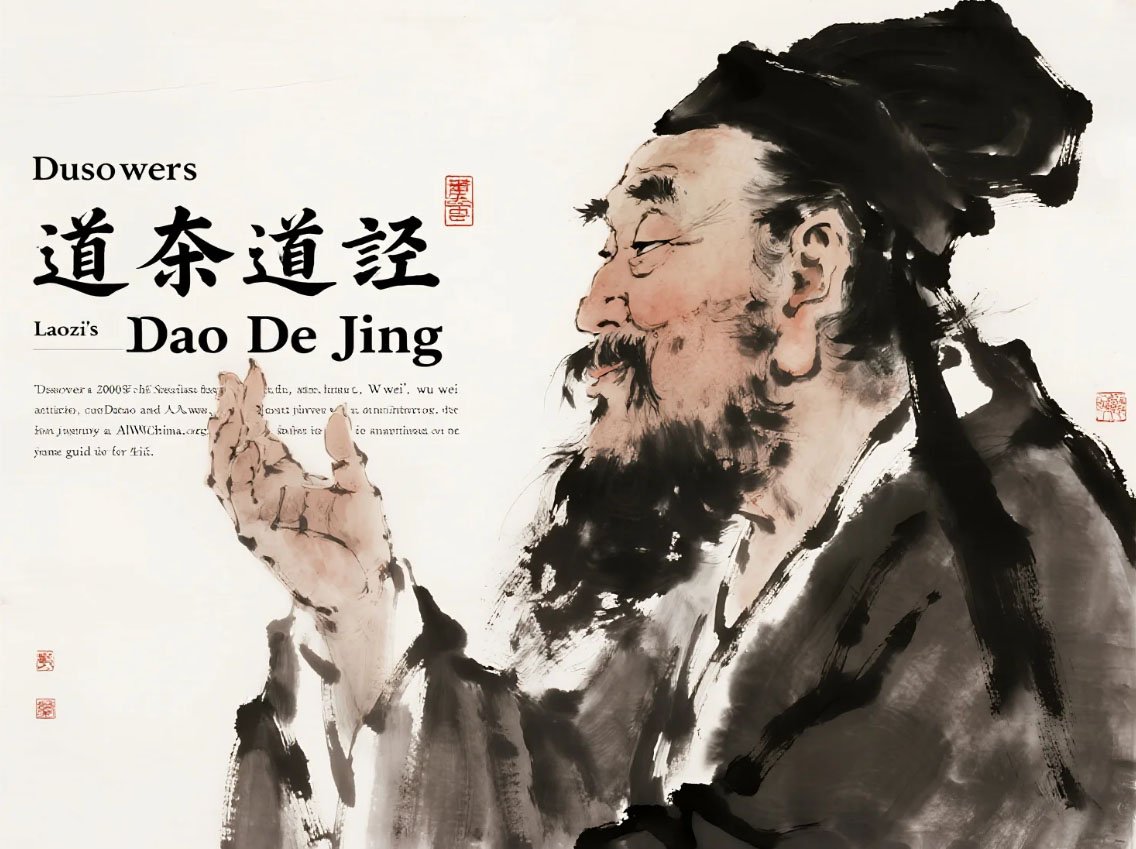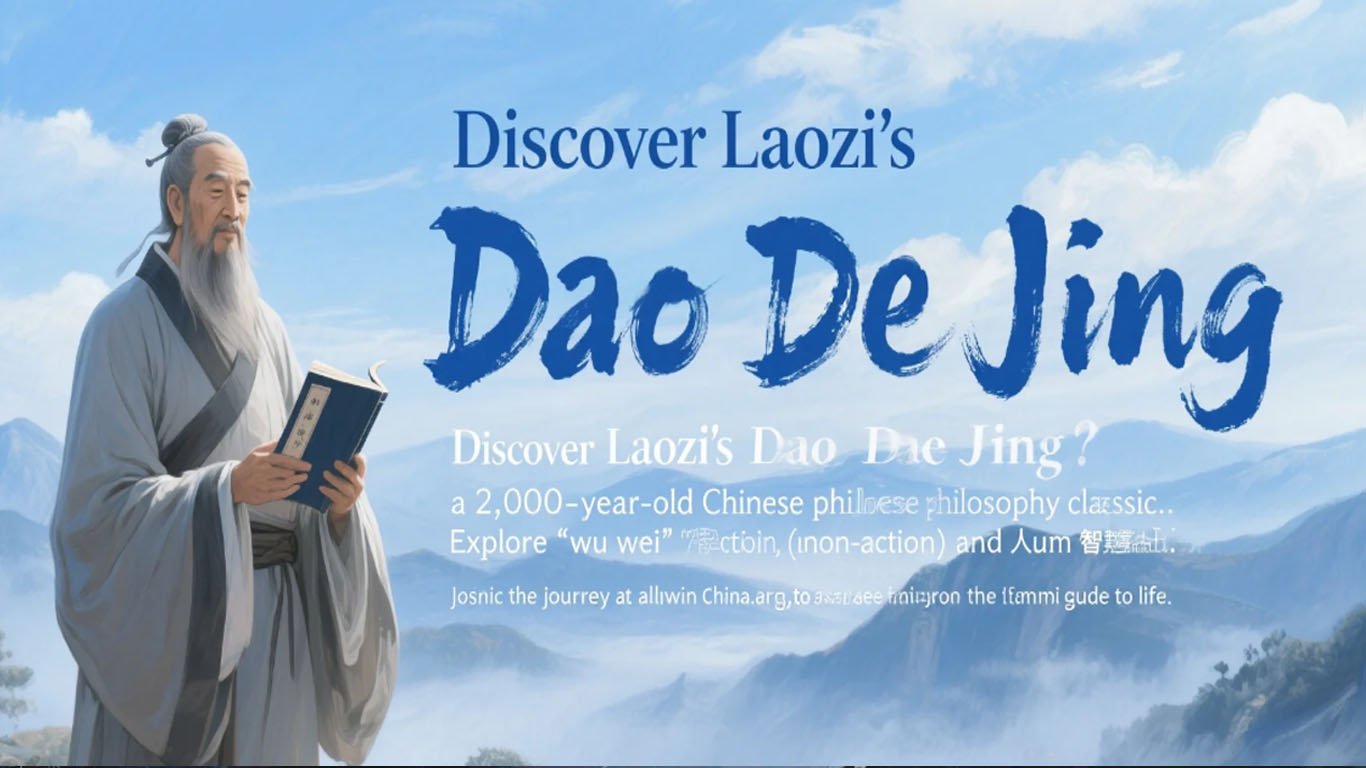The Birth of a Classic Over 2,000 years ago, an elderly sage left Luoyang, heading west. He wandered through mountains and rivers. At Hangu Pass, the
The Birth of a Classic
Over 2,000 years ago, an elderly sage left Luoyang, heading west. He wandered through mountains and rivers. At Hangu Pass, the warm-hearted guard invited him to stay. They talked deeply, and the guard was awestruck by the sage’s wisdom. “Before you retire, please write a book for posterity,” he urged. Thus, the sage stayed and penned 5,000 words. This became the Dao De Jing, and the sage was Laozi, founder of Daoism.
Why “Non-Action” Matters
The Dao De Jing is famed as the “king of classics.” Yet, its core idea, “wu wei” (non-action), avoids effort. Why? “Wu wei” is a life attitude, not laziness. For example, Laozi says, “Act without acting, do without doing.” By following nature’s flow, success comes naturally. Moreover, this idea is globally resonant. Translated more than any text except the Bible, the Dao De Jing is the world’s oldest philosophical classic.
Exploring the Book’s Wisdom
Welcome to the Daily Book Club, where we dive into great reads. Today, we explore the Dao De Jing by Laozi. Let’s travel back 2,000 years to uncover its treasures. Through this guide, you’ll grasp its profound ideas. We’ll cover three parts: first, Laozi’s “wu wei” philosophy; second, his insights on the cosmic Dao; and finally, his views on human life.
The Philosophy of Wu Wei
Laozi’s key idea is “wu wei,” or non-action. In the Dao De Jing, he writes, “Man follows earth, earth follows heaven, heaven follows Dao, Dao follows nature.” This “naturalness” is the book’s essence. Everything must flow naturally, without force. Thus, “wu wei” means acting without greed or haste. For instance, loving basketball makes practice effortless. Kobe Bryant’s skill came from passion, not forced effort. However, if someone plays for fame, it feels like a chore.
Wu Wei in Action
“Wu wei” deepens with “do without doing” and “taste the tasteless.” When you act naturally, things fall into place. Moreover, a calm mind finds true joy. Laozi, a tranquil figure, believed in following your heart. If you love reading, it’s not work—it’s joy. Conversely, forcing yourself to read feels draining. Steve Jobs said passion drove Apple’s success, not profit. Thus, “wu wei” means finding what you love and letting it guide you.
The Power of Softness
Laozi also praised softness over hardness. He wrote, “The softest thing overcomes the hardest.” For example, water wears down stone over time. Soft things, like living bodies, brim with life. However, rigid things, like dead wood, lack vitality. Thus, Laozi urged flexibility in life. Leaders should govern with “wu wei,” avoiding overcontrol. By letting people thrive naturally, society stays harmonious. This “non-action governance” rejects authoritarian rule.
The Cosmic Dao
Now, let’s explore Laozi’s cosmic Dao. The Dao De Jing mentions “Dao” over 70 times. Its opening line states, “The Dao that can be named is not the true Dao.” The Dao is formless, beyond words. It existed before the universe, birthing all things. Moreover, the Dao’s principle is “benefit without harm.” Like water, it nurtures without competing. Water flows to low places, yet it holds immense power. Thus, the Dao is selfless and inclusive.

Dao de Jing laozi
The Law of Opposites
Laozi saw the universe as dualistic. Everything has opposites—yin and yang. He wrote, “The greatest fullness seems empty; the straight seems bent.” Things transform into their opposites when pushed too far. For instance, overwatering a plant kills it. This “reversal” is the Dao’s law. Laozi’s dialectic, predating modern theories by 2,000 years, shows why his ideas endure. They reveal the universe’s dynamic balance.
Laozi’s Human Dao
Laozi’s human Dao covers three views: peace over war, simplicity in society, and contentment in life. In the chaotic Warring States period, he opposed war. “Those who aid rulers with Dao don’t use force,” he said. Armies bring ruin, not prosperity. Thus, war defies the Dao’s nurturing nature. Laozi warned rulers against militarism, a lesson still relevant today. His humanitarian spirit shines through.
Return to Simplicity
Laozi also urged a return to simplicity. He believed humans are naturally pure, like infants. In chaotic times, people should embrace this “true nature.” He wrote, “Simplicity scatters into tools, but the sage uses it to lead.” By staying simple, society finds peace. Moreover, Laozi saw simplicity as the Dao’s essence. This call to “return to the true” remains a powerful guide for living.
Contentment Brings Wealth
Finally, Laozi taught “contentment brings joy.” He said, “No calamity is greater than discontent; no fault worse than greed.” True wealth is inner satisfaction, not material gain. For example, Jin dynasty’s Shi Chong flaunted wealth, only to face ruin. Laozi believed endless desires lead to misery. Instead, find joy in what you have. This mindset avoids trouble and brings true fulfillment.
The Dao’s Simplicity
The Dao is simple, yet profound. Laozi wrote, “The Dao births one, one births two, two births three, three births all things.” Everything starts and ends with simplicity. Thus, a meaningful life is clear and quiet. By embracing simplicity, we touch the universe’s mysteries. The Dao De Jing remains timeless because it speaks to all.
Join the Philosophical Journey
Inspired by Laozi’s wisdom? Share your thoughts at allwinchina.org/portfolio or on X with #DaoDeJingInsights. Contact us at philosophy@allwinchina.org to discuss or suggest ideas. This journey, updated at 6:50 AM PDT, August 30, 2025, grows with your input. What Daoist idea resonates with you? Reflect below and let’s explore together!



COMMENTS